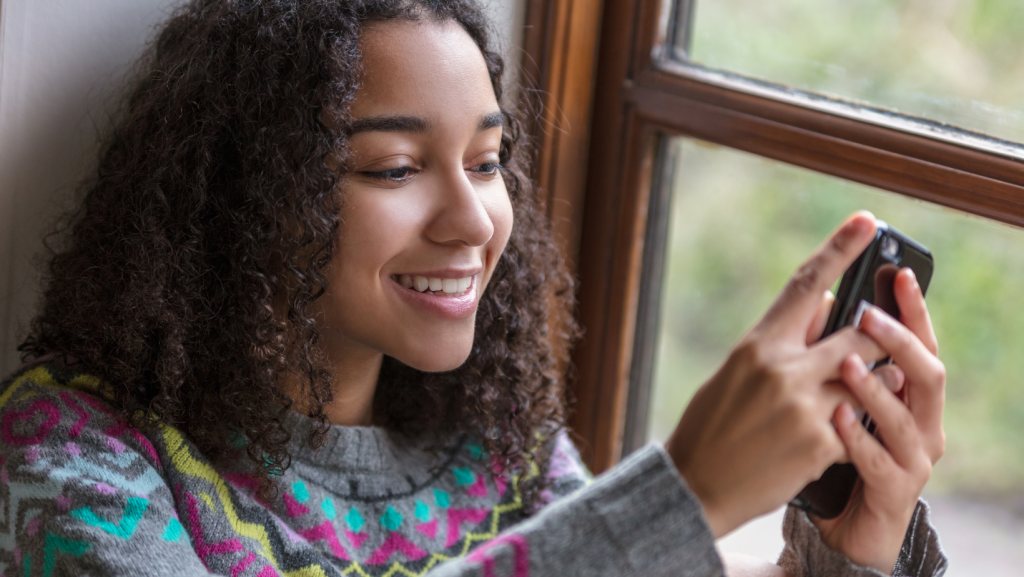
We live in an increasingly digital world.
This can be a really great thing. The internet and social media can help us stay connected with friends and family, even if we don’t live near them. This can be especially important for people who might feel isolated or lonely, or who perhaps are unable to leave their house.
The internet can also provide us with access to a wealth of information and resources that can help us learn more about mental health and how to look after ourselves. Not to mention the source of fun, entertainment and relaxation it can provide, with films, TV shows, games and more right at our fingertips.
However, like most things in life, the internet has it’s negatives and so should be used with care. It’s particularly important that our children and young people are supported to access and use the internet safely.
We’ve identified a few of the potential risks associated with internet and social media use, as well as some of the ways you as a parent or carer can help your child stay safe online.
Social media usually shows us the carefully selected best parts of someone’s life – but often that makes us think that someone’s whole life looks like their ‘best bits’. That can make it really easy for us to compare their positives with our own negatives. Such comparison can contribute to feelings of anxiety and low mood, and can have a significant impact on our mental health.
Our social media feeds can quickly become full of ‘beautiful’ people wearing expensive clothes, perhaps showing us their workout routines or favourite make up looks. For some, this constant stream of deemed ‘perfection’ can make us conscious of our own appearance.
Sadly, perpetrators of bullying can now hide behind screens and keyboards whilst inflicting serious harm. This is called ‘cyberbullying’, and is worryingly common. If your child is being bullied, it will undoubtedly affect their mental health and should be dealt with really seriously.
And as if the actual content we’re consuming wasn’t enough, the practice of using social media can be harmful in itself. Spending too much time on screen can lead to poor sleep – numerous studies have shown that increased use of social media has a negative effect on your sleep quality. And social media can be incredibly addictive. It has a powerful draw for many people that leads to them checking it all the
time without even thinking about it.
So – what can we do? How do we keep our children and young people safe online?
The first, and potentially most important, thing you can do is talk to your child. Hearing and understanding them and nurturing their trust in you will help build strong foundations should they ever need your help or guidance. Reassure your child they can come to you about anything they have seen that is worrying them, and that their safety is your priority.
Encourage positive social media use! Not all social media use is bad, and lots of what we can engage with online can be really helpful. Encourage your child to use social networking sites in a positive manner to connect with their friends, and to avoid mindlessly scrolling. Importantly, you should model to them the sort of behaviour your expect from them. You can’t tell your child to reduce their screen time whilst spending all evening on your own phone; nor can you ask that they be polite and kind to others on social media if they can see you post and comment negative messages.
Encourage privacy. By being informed on the ways in which information can be shared online, you can help your child with their privacy settings in order to better protect their safety online. Work together to ensure the right settings are in place around privacy and location.
Teach your child about ‘fake news’. Children should be aware that not all information found online is correct, accurate or relevant. Show your child how to check information they find by comparing it to alternative sources on the same topic.
Whatever their age, it’s a good idea to sit down together with your child to come up with some agreements about how much time they spend online to protect their wellbeing.
For example, you might want to agree that they shouldn’t go online just before bed or use any devices at night, because this can affect their sleep. You can often set timers on devices to limit internet use – but try to help your child manage this for themselves as well.
Setting parental controls can be a good way of gaining peace of mind that your child isn’t accessing anything inappropriate or unsafe. It is, however, important to remember that as your child grows up they may learn ways of getting round these. This is why it is so important to be able to talk openly to your
children about social media and the risks in order to help them make good decisions for themselves.
By staying informed, being proactive and nurturing trusting relationships with your children, you can help them navigate the digital world with confidence and security.
As parents and carers, it’s natural to feel concerned about your child’s social media use. With so many potential dangers and negative outcomes, it’s understandable to feel a sense of fear and uncertainty. However, it’s important to remember that social media can also offer a lot of positive opportunities for growth and connection. The good news is that you don’t have to navigate any of this alone. There are so many tools and resources available to you. You can access our full social media guide for parents below, and at the back of that there are a number of additional resources and services that may be useful to you.